

After my second graders learned the note "do," I was in need of a creative way for them to practice singing, playing, reading, and writing the new note. I came up with a very simple composition worksheet and SMART Notebook template. During one class period, we completed the entire activity as a whole class first, then I split the class into groups of 3-4 students.
During the next class period, each group began with the worksheet only. They had to check off one box at a time to graduate to the next level of complexity. For example, I had to approve their composed rhythm before they could move to a barred instrument to begin adding the melody. Once their song was completed on the worksheet, I listened to the group members sing and play it on their barred instrument before they could move to the computer phase.
While some groups were on the computers, other groups were using instruments with three choices: continue to practice your own song, trade papers and practice other groups' songs, or play known do-mi-so folk songs by ear. This was quite raucous, but it kept everyone busy with only 5 computers in the room. The variety of activity also allowed me to roam around and assess the kids' reading and playing skills. The whole activity only took three class periods, and the amount of learning, music making, and assessing was awesome!
Below are two of the many amazing songs the second graders composed. (As you can see, it was approaching winter break when we completed this activity last year.)
I printed a color copy of the song for each child in the group and one for me. They all turned out so beautifully that I made a bulletin board for outside the music room. (Confession: My amazing husband actually put it all together and hung it in the hall. Who knew he was such a meticulous bulletin board designer?) It was up the rest of the year! The best part about that bulletin board was the first graders' reactions. I can't remember how many times I was asked, "Will we do that in second grade?" Indeed, we will!!
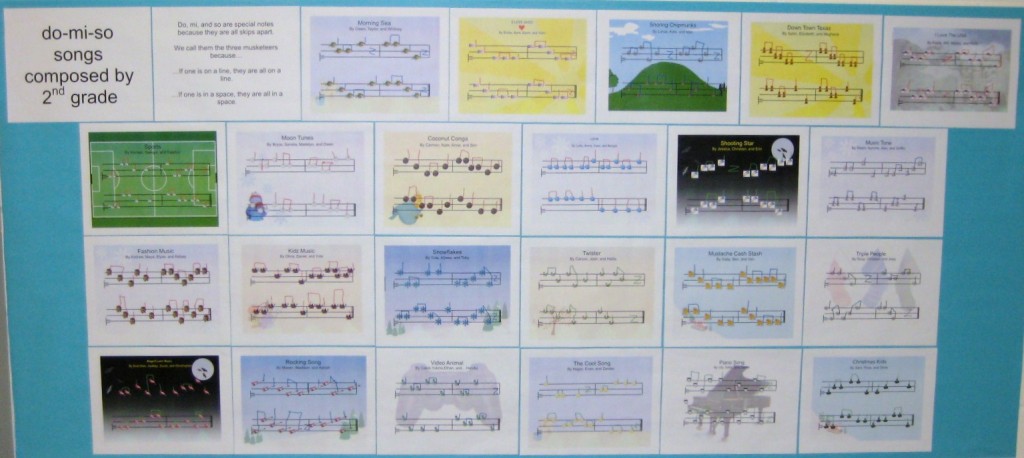
Last year's fourth graders created their own choreography to some of the dances from Act II of Tchaikovsky's The Nutcracker ballet. We used and/or created listening maps of the dances first, paying close attention to the forms of each piece. (Download the SMART Notebook file here.) As the students shared their movement ideas, I served as a facilitator and occasionally an editor. I was especially impressed with Mrs. Stephens's class. They chose the Spanish Dance which has a very distinctive castanet part. I pulled up a video of a flamenco dancer demonstrating castanet technique. This inspired the kids to request more flamenco videos, and they used some of the steps from those videos in their own choreography. While the Spanish Dance might not be the most exciting of the three classes, it is certainly the most authentic and inspired. Watch all three videos below!
Mrs. John's Class
[vimeo=35845497]
Mrs. Stephens's Class
[vimeo=35844056]
Mrs. Triplett's Class
[vimeo=35842650]
Like last year, in preparation for a new school year and new composers of the month, here is an archive of the composers and resources we studied at Washington Elementary in the 2011-2012 school year. Be sure to check out the Composer of the Month page to learn about the 2012-2013 composers.
![]()
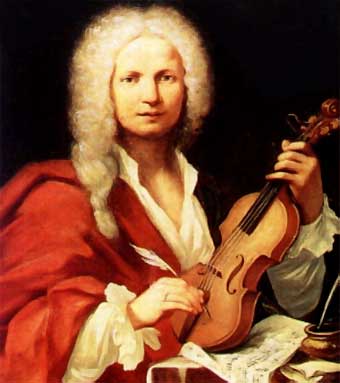
February/March: Antonio Vivaldi (March 4, 1678 – July 28, 1741).
Antonio Vivaldi composed hundreds of musical works in his lifetime during the Baroque period. Most of his compositions were written for the girls he taught at an Italian orphanage. Here are the podcast episodes from Classics for Kids about Vivaldi and his work. Vivaldi's most famous compositions are his Four Seasons violin concertos. Each of the concertos was inspired by a painting and they were composed to musically illustrate four sonnets. Music that tells a story with no singing, acting, dancing, or pictures is called program music.
[vimeo=5254897]
![]()

January/February: Wolfgang Amadeus Mozart (January, 27 1756 – December 5, 1791).
Wolfgang Amadeus Mozart was one of the great master composers of the Classical Period. Here are some podcast episodes about Mozart's life and work. Students in grades 1-3 will be reading Young Mozart, written and illustrated by Rachel Isadora. Here are some audio recordings and a brief biography of Mozart from the Dallas Symphony Orchestra Kids website.
Mozart wrote over 600 pieces of music in his short 35 years, and 22 of those pieces were operas. One of his most famous operas is Die Zauberflöte, the German opera The Magic Flute. Below are two videos from the Seattle Opera's 2011 production of Die Zauberflöte. The first video gives some information about how opera composers and singers use their voices to portray different characters and emotions. The second video is a preview of the opera, complete with costumes, sets, and the evil Queen of the Night.
[vimeo=23238498]
[vimeo=23379401]
![]()
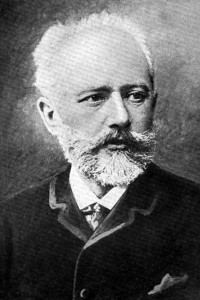
December: Pyotr Ilyich Tchaikovsky (May 7, 1840 – November 6, 1893).
You will probably remember that we learned about Tchaikovsky around this time last year. The students love the music of The Nutcracker so much, we look forward to studying it each year around the winter holidays. You can listen to some podcasts about Tchaikovsky and his Nutcracker ballet here. We will be listening to some of these podcast episodes in class. Be sure to click on the "Read About the Show" links to take the quizzes and test your knowledge. Here is the Amazon link to the picture book version of The Nutcracker that first grade will be reading in music class.
Below are some great video clips of professional dancers rehearsing portions of the Nutcracker ballet. You can get a really close look at the physical demands of ballet dancing as well as the ballerinas' use of their special pointe shoes.
[vimeo=32222812]
[vimeo=2306634]
BalletMet's production of The Nutcracker is excellent every year and is performed at the historic Ohio Theatre in downtown Columbus. This year's performances run from December 9 through December 24, and tickets start at $20. If your family is interested, tickets can be purchased online here.
![]()
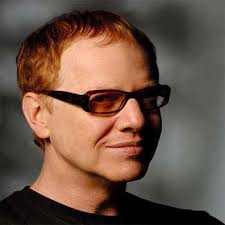
October: Danny Elfman (born May 29, 1953).
Danny Elfman is a composer best known for his work writing the music (scores) for films, especially those by Tim Burton. A few of the more than 60 films and television shows for which Elfman has composed are Pee Wee's Big Adventure, Batman, The Nightmare Before Christmas, Corpse Bride, and Alice in Wonderland. Elfman's music is often dark and creepy, using interesting instrumentation and ethereal sounding choirs.
Here are two clips from Corpse Bride. The first has background music by Danny Elfman. In the second, Elfman wrote the music AND sings the voice of Bonejangles.
[vimeo=9729948]
[vimeo=9730932]
To conclude our unit of study about Danny Elfman, students will be watching Corpse Bride or The Nightmare Before Christmas in music classes in the coming weeks. Both movies are rated PG for some scary images. If you do not wish for your child to watch one of these movies, please let me know, and I will find an alternate activity for your child.
![]()
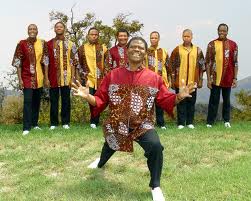
September - Africa: Joseph Shabalala (born August 28, 1941) with Ladysmith Black Mambazo.
Here are some videos of Ladysmith Black Mambazo from their official website. You can also listen to recordings here. Here is their iTunes page. Here is a video of one of my personal favorites from my childhood.
Ladysmith Black Mambazo is coming to Columbus! They will be performing at the Southern Theatre on Wednesday, February 8. If you're interested, tickets can be purchased here.
Reblogged from Facetious Firecracker:
There are some stereotypes about music teachers in this country and for some reason, they’ve been getting to me lately. Generally, I avoid discussing my career on here because honestly, I have a great job. I get to play games, teach kids how to create music, and I get most of the summers off. You won’t hear me complaining about the pay (except in jest) and frankly, there aren’t many music jobs out there. My district has brand new, state of the art buildings with SMART boards in every room. I am NOT intending to write this post about my specific job, just the general problems that any music teacher can appreciate. Now, with that being said, here I go….
1. We get really tired of people thinking that our job is nothing but fun and games.
Hooray! It’s like extra recess!
I was once asked, “Are you a real teacher or just a music teacher?” Questions like that make my blood boil. Obviously, I can’t get the entire world to see it my way, but as far as I’m concerned, I’m a teacher. My subject happens to be music. I say that in the same way that someone would say they teach high school biology. Music is defined as a core academic subject in No Child Left Behind. Music has National and State Academic Content Standards, just as any other subject. It is my job to make sure that my students master the material. I just have about 22 hours of instruction time per school year to make that happen.
2. The general public thinks that they know everything about what I do, and that anyone can do it.
I played guitar in a band in high school! What do you mean I can’t teach band better than you?
Every nincompoop who has ever touched a drum tells me they can “play” the drums. Now, some of these people actually can. I am totally not a music snob and I understand there’s a huge difference between being a talented amateur musician and someone who just beats on things. However, unless you have a music degree, don’t pretend like you could do my job. It’s not common knowledge and there’s way more to it than you think. Unless you have had to be tested on everything from music history, educational psychology, your performance of a concerto for an audience of highly trained professionals, memorization of fingerings for the bassoon (and every other instrument), etc., don’t tell me you could do my job.
3. We have to constantly remind people why what we do is important, for fear of losing our programs.
This is what happened to the last guy who threatened to cut music.
I’d say most music teachers live in constant fear that we’re going to lose our jobs. We fear it not just for ourselves, but for our students. After all, who do you think inspired us to teach music? That’s right – our music teachers. Without music programs in schools, we risk losing part of our culture for the future. When we examine past cultures, what do we use to judge how civilized they were? Paintings, musical compositions, architecture, tools, language, and clothing. In other words – ART. In fact, we use the fine arts of past cultures to judge how much they knew about our current so-called “core subjects.”
Do you think people in the future are going to look at our standardized test scores to see how well we lived? Of course not. They’re going to study our ability to create ART.
And along the same lines….
4. We really hate using other subject areas to justify our subject.
If one more person mentions the “Mozart Effect” I’ll scream!
Yes, it’s totally true that instruction in music helps people to understand math and science better. It raises college entrance test scores. It forms new synapses in the brain, connecting the two hemispheres better than any other subject can. In fact, stroke patients who are no longer able to speak can sometimes still sing songs and use that for speech therapy. So yeah, I guess you should learn music because it makes you smarter.
But…
Music teachers are so tired of using that spiel in order to defend what we do. We didn’t go into teaching music because we wanted to get better at math. We want what we do to be valued for its own purpose. We want people to think it’s important to have music in schools, well, just because it is! Imagine your life without music.
Silent commercials and movies, with the exception of dialogue. Awkward silences while shopping. Silent car rides. All in all, pretty boring. We teach music because it’s like painting for your ears. It expresses emotions. It can even change your emotions.
6. People think that you can’t test what we teach, and that every student should be given an A.
Brian was devastated that his daughter didn’t pass choir. After all, she sang during at least half of the days she was there.
Music teachers are data-driven teachers who use research and self-reflection to constantly assess the effectiveness of their instruction and to improve their teaching methods, just as any other teacher does. Yes, you can give a test on how well little Johnny plays the trumpet. The notes are either right or wrong, in tune or not, played for the correct duration or not, and so on. Using a rubric, it is possible to assign fair grades to students based upon performances and written tests that are based upon facts taught during class. No, your child should not be given an automatic A in a performance-based class. Grades are earned based on your child’s demonstration that he or she has mastered the skills taught in class, which are based upon the academic content standards in music.
7. We really do love our jobs – and our students!

We mean it. We are some of the only teachers who literally get to watch our students grow up. Music teachers usually have their students for multiple consecutive years and form great bonds with them. Our jobs are super fun and best of all, we get to do what we love every day – make music.
Below is the Google presentation, including all of the links from my OMEA/TI:ME conference session "Web Apps for the Music Classroom" presented February 18, 2012 at 8:00 AM.
P.S. If you want to check out the #musedchat hashtag on Twitter before making the leap to getting your own Twitter account, click here.
Watch the whole presentation below!
[vimeo=38726146]